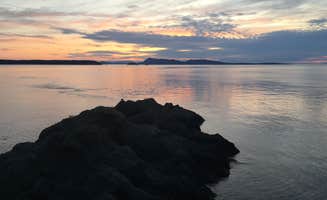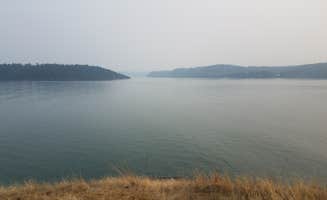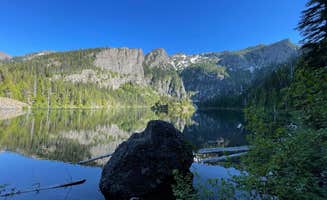Dispersed camping near Deer Harbor, Washington requires careful preparation due to the remote nature of available sites. This San Juan Islands location experiences mild summers averaging 70°F and wet winters with temperatures around 45°F. Seasonal access varies significantly between locations, with most primitive sites lacking basic amenities and requiring permits obtained before arrival.
What to do
Wildlife observation sessions: Visitors to Hope Island Marine State Park often report excellent wildlife viewing opportunities. "There were raccoons on the island with us" and "there were some sea lions swimming around in the area," according to camper Jess G., who suggests checking water conditions before arrival.
Island exploration: Pack light for trails that circle small islands in the region. At Hope Island, campers appreciate the "beautiful views with a trail that circles the island" which provides "a very romantic setting" despite the "rough paddle to this island."
Swimming at freshwater lakes: Several backcountry lake locations offer swimming opportunities during summer months. Lake Angeles in Olympic National Park provides isolation "right next to Lake Angeles" though visitors should "bring bug repellant" as there are "lots of bugs" according to camper Luis N.
What campers like
Complete solitude: The remoteness of these primitive sites often means having entire areas to yourself. Raphaela H. reports that at Hope Island Marine State Park, "I was worried, with only four camping spots, that we wouldn't get one, but we ended up being the only people on the island."
Challenging access: The effort required to reach these sites creates memorable experiences. Raphaela notes that Hope Island "is only accessible by boat" and suggests renting kayaks at Boston Harbor for "an easy and un-intimidating introduction to kayaking."
Natural settings: The undeveloped nature of these locations preserves their character. At Point Doughty, one camper observed "2 orca whales cavorted just 100' off and a stellar sea lion, harbor seals and many sea bird varieties provided fantastic entertainment" while camping directly on the beach.
What you should know
Limited facilities: Most dispersed sites provide minimal amenities. At Pine Lake Campground, expect "cute sites" but no drinking water, showers, or hookups.
Challenging terrain: Physical ability requirements vary by location. Point Doughty features "a path up to the sites from the beach is very steep and slippery on the dirt but there is a rope to help," according to Pat M., who notes it's "not recommended if you need to haul myriad items up to the campground."
Weather dependency: Marine access sites require monitoring forecasts. For Hope Island, Jess G. recommends "for anyone planning to stay here to look into the waters, tide and wind report the day of. Or if you have the option of using a motorized boat!"
Permit systems: Most sites require permits for overnight stays. Lake Angeles requires reservations and permits while being a "primitive campground, so bring your own water, trowel, tp, everything!!"
Tips for camping with families
Pack essential supplies: Without services available, families must carry all necessities. Luis N. notes that Lake Angeles is a "super cool, isolated campground" but requires a 4-mile hike "with ~2,500ft of elevation gain," so families should pack accordingly.
Site privacy considerations: Select locations based on trail traffic. Duane and Janey D. warn that at Pine Lake Campground, "you will be interrupted 500 times a day with walkers who use the trail and want to go straight through your site."
Plan appropriate boat transportation: For marine sites, carefully match watercraft to family abilities. Jess G. found Hope Island to have a "rough paddle" while Raphaela H. suggests Boston Harbor for kayak rentals that provide "not your typical camping trip!"
Tips for RVers
Limited accessibility: Most dispersed camping locations near Deer Harbor prohibit vehicle access altogether. The steep terrain, boat-in requirements, and hiking access make these sites unsuitable for RVs.
Alternative options: RVers should look to established campgrounds on nearby islands with ferry access instead of dispersed sites. The primitive locations described here are exclusively for tent camping with backpacking or boat-in equipment.




